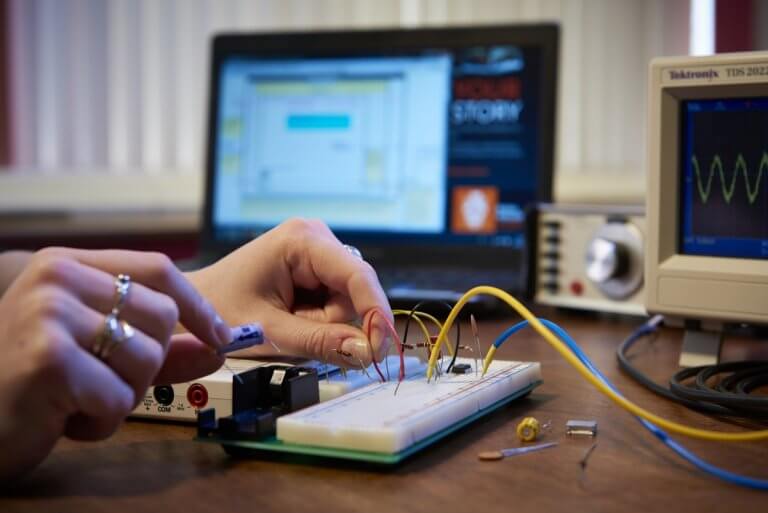
The rich history of Royal Holloway University of London
By fusing the illustrious heritage of Royal Holloway, University of London’s Faculty of Science with the expertise of its newly-formed Department of Electronic Engineering, this Surrey-based university stands as the ultimate UK study platform.
Founded by two social pioneers in 1849, the institutions of Elizabeth Jesser Reid (Bedford College) and Thomas Holloway (Royal Holloway College) were among the very first UK institutions to give women access to higher education and to appoint female professors. With an established reputation for inclusive education, Holloway and Reid inspired thousands of colleges to follow in their footsteps.
In 1985, these two distinguished institutions joined forces to form the college now known as Royal Holloway, University of London. Despite its modern approach to learning and continued investment, you will still find many traditional gems scattered around its London campus. The magnificent Founder’s building, for example, which was opened by Queen Victoria in 1886, and has been a focal point of campus life ever since.
It’s not only within the architecture that such history remains; it’s also found embedded in the university’s academic ethos. What you may not know is that Jane Holloway – wife of the institution’s founder – inspired her husband to create equal educational opportunities for women. Before creating the college, he was due to take on another project, but Jane persuaded him to build a college to support female education. The university still utilises a study hall that celebrates her name.
A longstanding track record of equality and diversity sets Royal Holloway, University of London apart from the rest. By promoting women in science and encouraging female applicants to follow their future goals, the university is consistently adapting and advancing.

Women in science
A recent skills survey conducted by the Institution of Engineering and Technology (IET) has revealed that women make up just nine percent of the UK’s engineering workforce. It’s astonishing to see such a low figure in early 2018.
But that’s not to say that women have never been present on the engineering circuit. As Royal Holloway Electronic Engineering lecturer, Dr Stefanie Kuenzel, explains, “By discovering Edith Clarke (1883 –1959), who allegedly was the first female electrical engineer, it was made clear to me that women working in Engineering or Power Systems is really not a new topic, but even allowing for elapsed time, it’s noteworthy that the percentage of women working in the field remains small.”
That’s why the university’s Department of Electronic Engineering is so committed to encouraging more female engineers, engaging them through a dynamic portfolio of degrees. With an industry-focused curriculum and cutting-edge research facilities, Royal Holloway, University of London’s electronic engineering programmes are igniting a wealth of student interest.
Regardless of current statistics, Dr Kuenzel explains that there’s never been a better time to get involved with the subject. “With the renewable generation, new transmission technologies and changes in the demand side, power systems are currently undergoing major changes. This is an exciting time for motivated students as our established department at Royal Holloway is looking forward to educating some of the brilliant women engineers of tomorrow.”
To continue this gender-neutral endeavour, the Department of Electronic Engineering is moving into a brand new science building. This extraordinary study space will have state-of-the-art technology available for all staff and students, plus a 268-seat lecture theatre, multi-functional seminar rooms and innovative laboratories.

During the construction of this new learning environment, students were given the chance to name it after a famous female in science and engineering. From the shortlisted candidates, the winner was announced in March, and the building will be known as the Beatrice Shilling Building, named after a pioneering engineer in the early half of the 20th century when female engineers were extremely rare. The name reflects Royal Holloway’s ambition and its students; a name that is both inspired by its principles and looks ahead to the future.
Shaping your future
Royal Holloway understands that every one of its engineering students has the potential to make a dramatic impact of their own. By developing vital tools and industry-based techniques in every lecture and practical project, you’ll be well-equipped to go out and thrive as you enter the working world.
As Tilly, MEng Electronic Engineering student, states: “The most enjoyable thing for me about my degree has been the experiments and projects we’ve been doing right from the start of the course. We’ve worked in groups designing, building and pitching prototypes similar to how it is done in the industry.”

From day one, you’ll be mentored by highly-experienced staff members who understand how to get ahead in the engineering sector. By transferring their knowledge to you via interactive group work and practical projects, time spent at Royal Holloway is exceptionally-engaging.
Another exciting addition to this unforgettable student experience is its campus-based activities. Recently, the college has hosted a set of events based on the suffrage movement. As suffragette Emily Wilding Davison, is one of the university’s most famous alumni, it’s only right that Royal Holloway marked the 100th anniversary of the women’s right to vote, naming its new state-of-the-art library and student services centre in her honour.
With consistent support on offer both during and after your studies, it’s fair to say that equipped with a degree in electronic engineering; your career prospects are strong. There’s no better time to study at Royal Holloway, so join them on their mission to raise that nine percent up to an equal figure.
Follow the Department of Electronic Engineering at Royal Holloway on Facebook and Twitter
Liked this? Then you’ll love these…
Royal Holloway University: Fostering innovation and inspiring change
Royal Holloway University: Engineering education for successful careers







